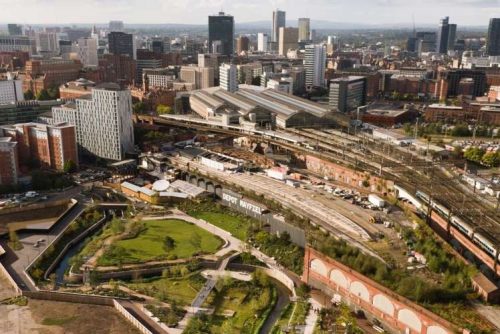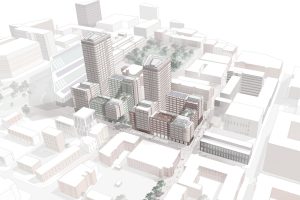Developers welcome bid to unlock untapped land near commuter transport hubs

The Government is to announce plans to target untapped land near commuter transport hubs to build new housing for working people, as part of new steps to reform the planning system and unlock growth – with Greater Manchester a key beneficiary.
It says the bold reforms will create secure, high-paying jobs and deliver major infrastructure faster to bolster public services and lower bills.
Ahead of Chancellor Rachel Reeves’s speech this week on economic growth, the Government has announced how it will go further and faster to deliver its Plan for Change milestones of 1.5 million new homes over five years and 150 decisions on major infrastructure projects by the end of the Parliament.
It follows reforms unveiled by the Chancellor in July and delivered by the Deputy Prime Minister at the end of last year through publication of the overhauled National Planning Policy Framework.
The Government’s next steps on planning reform include streamlining a set of national policies for decision making to guide planning decisions taken by local authorities and promote housebuilding in key areas.
In a major new growth push, the Government will ensure that when developers submit an application for acceptable types of schemes in key areas – such as in high potential locations near commuter transport hubs – that the default answer to development is ‘yes’.
This will unlock more housing at a greater density in areas central to local communities, boosting the Government’s number one mission to grow the economy.
These measures are aimed at transforming communities, with more shops and homes nearer to the transport hubs that working people rely on day in day out.
The Chancellor also revealed that she is championing a regeneration project around Old Trafford in Manchester that will see new housing, commercial and public space as a shining example of the bold pro-development model that will drive growth across the region, with authorities exploring setting up a mayoral development corporation body to redevelop the area.
The Government is also working with Greater Manchester to release growth-generating land around transport hubs through local development orders, such as around Castleton Station, with the potential for this innovative use of existing powers to kick-start building in these sites to be a blueprint for the rest of the country so that every corner of the UK benefits from growth.
Chancellor of the Exchequer, Rachel Reeves, said: “I am fighting every single day in our mission to kick-start the economy, deliver on our Plan for Change, and make working people better off.
“That includes avenues that others have shied away from.
“These are our next steps and I can say for certain, there is more to come.”
Deputy Prime Minister, Secretary of State for Housing and MP for Ashton-under-Lyne, Angela Rayner, said: “From day one I have been clear that bold action is needed to remove the blockers who put a chokehold on growth. That’s why we are putting growth at the heart of our planning system.
“Growth means higher wages, better living standards, families raising their children in safer homes, and the next generation taking their first steps onto the housing ladder.
“This year we will go even further to make the dream of homeownership a reality for millions and fix the housing crisis we inherited for good – getting more shovels in the ground to build the homes and vital infrastructure that our communities so desperately need.”
Mike Hood, CEO of developer LandsecU+I, said: “This is another welcome step from the Government to de-clutter the planning system and unlock growth.
“As major investors in the Greater Manchester region, it’s positive to see this Government backing the region and providing the tools it needs to realise its potential.
“We hope to see further interventions like this to unlock growth in more cities across the country.”
LandsecU+I is involved in the regeneration of Manchester’s Mayfield Park scheme which could involve creating 878 new homes for the city centre.
The £1.5bn development close to Piccadilly Station also includes two new office blocks.








